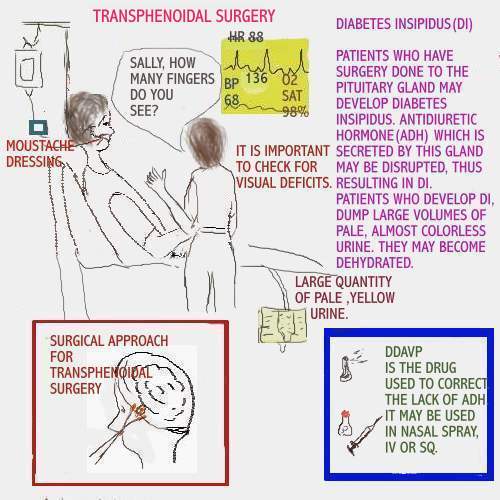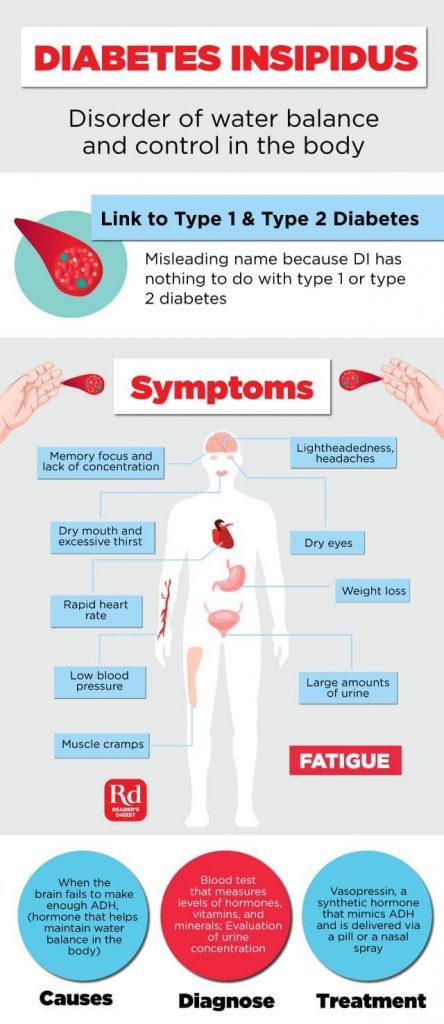Diabetes Insipidus L
Diabetes insipidus (die-uh-bee-teze in-sip-uh-dus) is an uncommon disorder that causes an imbalance of fluids in the body. this imbalance makes you very thirsty even if you've had something to drink. it also leads you to produce large amounts of urine. while the terms "diabetes insipidus" and "diabetes mellitus" sound similar, they're not related. If you have diabetes insipidus: 1. prevent dehydration. as long as you take your medication and have access to water when the medication's effects wear off, you'll prevent serious problems. plan ahead by carrying water with you wherever you go, diabetes insipidus l and keep a supply of medication in your travel bag, at work or at school. 2. wear a medical alert bracelet or carry a medical alert card in your wallet. if you have a medical emergency, a health care professional will recognize immediately your need fo
What is diabetes? what causes diabetes? htq.
Diabetes insipidus is a condition where the body loses too much fluid through urination, causing a significant risk of dangerous dehydration as well as a range of other illnesses and conditions. it. You're likely to first see your primary care doctor. however, in some cases when you call to set up an appointment you may be referred to a specialist called an endocrinologist. here's some information to help you get ready for your appointment. Treatment options for the most common types of diabetes insipidus include: 1. central diabetes insipidus. if you have mild diabetes insipidus, you may only need to increase your water intake. if the condition is caused by an abnormality in the pituitary gland or hypothalamus (such as a tumor), your doctor will first treat the abnormality. typically, this form is treated with a man-made hormone called desmopressin (ddavp, minirin, others). this medication replaces the missing anti-diuretic horm Some of the tests doctors use to diagnose diabetes insipidus include: 1. water deprivation test. while being monitored by a doctor and health care team, you'll be asked to stop drinking fluids for several hours. to diabetes insipidus l prevent dehydration while fluids are restricted, adh allows your kidneys to decrease the amount of fluid lost in the urine. while fluids are being withheld, your doctor will measure changes in your body weight, urine output, and the concentration of your urine and blood. your doctor
Diabetes insipidus is a rare condition that causes your body to make a lot of urine that is "insipid," or colorless and odorless. most people pee out 1 to 2 quarts a day. people with diabetes. Diabetes insipidus is a rare condition that causes your body to make a lot of urine that is "insipid," diabetes insipidus l or colorless and odorless. most people pee out 1 to 2 quarts a day. people with diabetes.
Diabetes Tipe 1 Dan 2 Lebih Bahaya Mana Halodoc
Diabetes insipidus (di) is a condition characterized by large amounts of dilute urine and increased thirst. the amount of urine produced can be nearly 20 liters per day. reduction of fluid has little effect on the concentration of the urine. complications may include dehydration or seizures. Central diabetes insipidus. if you have mild diabetes insipidus, you may only need to increase your water intake. if the condition is caused by an abnormality in the pituitary gland or hypothalamus (such as a tumor), your doctor will first treat the abnormality. Signs and symptoms of diabetes insipidus include: 1. extreme thirst 2. producing large amounts of diluted urine 3. frequent need to get up to urinate during the night 4. preference for cold drinksif your condition is serious, urine output can be as much as 20 quarts (about 19 liters) a day if you're drinking a lot of fluids. a healthy adult typically urinates an average of 1 or 2 quarts (about 1 to 2 liters) a day. an infant or young child with diabetes insipidus may have the following signs a
See full list on mayoclinic. org. See full list on mayoclinic. org. See full list on mayoclinic. org.
Nephrogenic diabetes insipidus that's present at or shortly after birth diabetes insipidus l usually has an inherited (genetic) cause that permanently changes the kidneys' ability to concentrate the urine. nephrogenic diabetes insipidus usually affects males, though women can pass the gene on to their children.

Amputasi Pada Pengidap Diabetes Bisa Susah Sembuh Halodoc
Diabetes insipidus occurs when your body can't properly balance the body's fluid levels. when your fluid regulation system is working properly, your kidneys help maintain this balance. the kidneys remove fluids from your bloodstream. this fluid waste is temporarily stored in your bladder as urine, until you urinate. the body can also rid itself of excess fluids through sweating, breathing or diarrhea. a hormone called anti-diuretic hormone (adh), or vasopressin, helps control how fast or slow f Diabetes insipidus is a condition that results from insufficient production of the antidiuretic hormone (adh), a hormone that helps the kidneys and body conserve the correct amount of water. normally, the antidiuretic hormone controls the kidneys' output of urine.


Diabetes insipidus is a rare disorder that occurs when a person's kidneys pass an abnormally large volume of urine that is insipid—dilute and odorless. in most people, the kidneys pass about 1 to 2 quarts of urine a day. in people with diabetes insipidus, the kidneys can pass 3 diabetes insipidus l to 20 quarts of urine a day. Diabetes insipidus (die-uh-bee-teze in-sip-uh-dus) is an uncommon disorder that causes an imbalance of fluids in the body. this imbalance makes you very thirsty even if you've had something to drink. it also leads you to produce large amounts of urine. while the terms \\"diabetes insipidus\\" and \\"diabetes mellitus\\" sound similar, they're not related. diabetes mellitus — which can occur as type 1 or type 2 — is the more common form of diabetes. there's no cure for diabetes insipidus. but treatments Diabetes insipidus may lead to dehydration. dehydration can cause: 1. dry mouth 2. changes in skin elasticity 3. thirst 4. fatigue. Diabetes insipidus is a rare condition in which there is a problem with the secretion of antidiuretic hormone (adh). adh, also called vasopressin, controls the amount of water the kidneys release in the urine. adh is stored in the pituitary gland, which is located behind the bridge of the nose.
Komentar
Posting Komentar